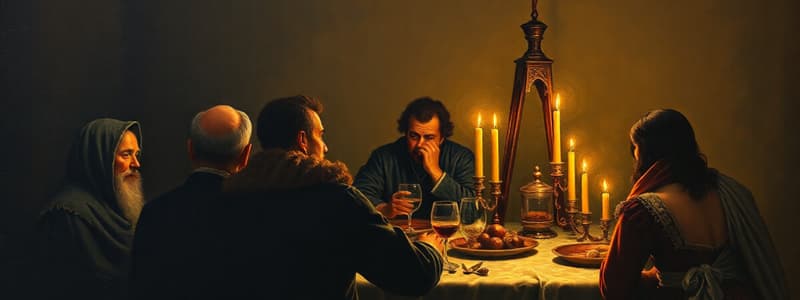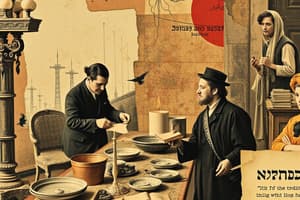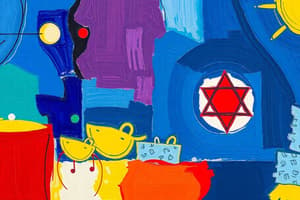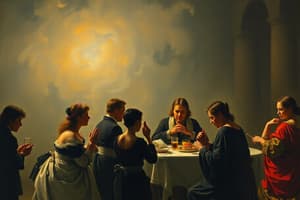Podcast
Questions and Answers
What does Hatarat Nedarim involve?
What does Hatarat Nedarim involve?
- The reaffirmation of previous vows
- Making new promises
- The canceling of all promises and vows (correct)
- Asking forgiveness from others
Why is Rosh HaShana significant for judgment?
Why is Rosh HaShana significant for judgment?
- It is the day Adam Ha'Rishon was created and judged (correct)
- It is a time for community celebrations
- It marks the beginning of the year
- It is when the Torah was given
What does a Beinoni represent on Rosh Hashana?
What does a Beinoni represent on Rosh Hashana?
- Someone whose merits outweigh their sins
- Someone whose scale is exactly even (correct)
- Someone who is beyond redemption
- Someone who has a significant number of sins
What is Kol Nidrei known for?
What is Kol Nidrei known for?
What is the mitzvah on Erev Yom Kippur?
What is the mitzvah on Erev Yom Kippur?
What does the term 'Simana Milta' imply?
What does the term 'Simana Milta' imply?
What is the final meal before Yom Kippur called?
What is the final meal before Yom Kippur called?
Which action is prohibited on Yom Kippur?
Which action is prohibited on Yom Kippur?
What is Kapparot traditionally associated with?
What is Kapparot traditionally associated with?
Why is wearing white on Yom Kippur significant?
Why is wearing white on Yom Kippur significant?
Flashcards are hidden until you start studying
Study Notes
Rosh Hashanah
- Hatarat Nedarim is the canceling of all promises and vows
- Hatarat Nedarim is performed on the eve of Rosh Hashanah as it is a serious matter to break promises
- Selichot - prayers for forgiveness - are said early in the morning on the eve of Rosh Hashanah
- Rosh Hashanah is the day of judgement as Adam Harishon (the first human) was judged on the same day as the day he sinned
- The three books refer to:
- Tzadikim – the righteous
- Beinoni – those who are neither good nor bad
- Resha’im – the wicked
- Beinoni - means someone who is neither good nor bad and their judgement is postponed until the Ten Days of Repentance
- Simana Milta means the symbol is real and that actions have a true meaning and purpose
- The custom of eating apples dipped in honey symbolizes a sweet new year like the grandmother in the story who had forgotten her grandchild’s birthday and used honey to make up for it
Yom Kippur
- Kapparot - a custom where a chicken or money is placed on the head and is swung in a circle and then given away
- Erev Yom Kippur (the evening before Yom Kippur) is when it is most important to eat a meal
- It is important to ask for forgiveness on **Erev Yom Kippur ** as forgiveness from Hashem only occurs for sins between people if those people have forgiven each other
- Vidui – confession – includes physical actions like pounding one’s chest
- Seudat HaMafseket – the breaking of the fast meal – is eaten on Erev Yom Kippur
- E-D-W-A-L stands for (what is forbidden during Yom Kippur):
- Eating
- Drinking
- Washing
- Annointing oils or creams (or applying)
- Leather shoes
- White clothing symbolizes purity and cleanliness for Yom Kippur
- Kol Nidrei - a prayer recited three times during the Yom Kippur service, each time slightly louder than the last
- Neila - a special prayer that is recited at the conclusion of Yom Kippur
- Neila means “closing” in reference to closing the gates of heaven
- The Book of Jonah is read on Yom Kippur to emphasize that Hashem accepts repentance
Studying That Suits You
Use AI to generate personalized quizzes and flashcards to suit your learning preferences.




